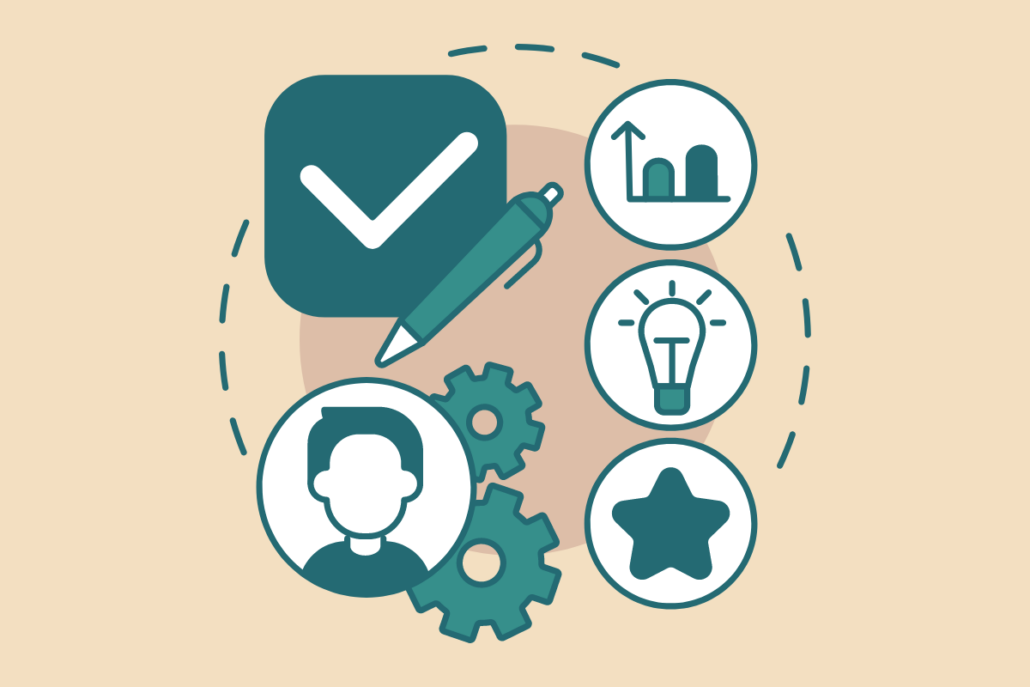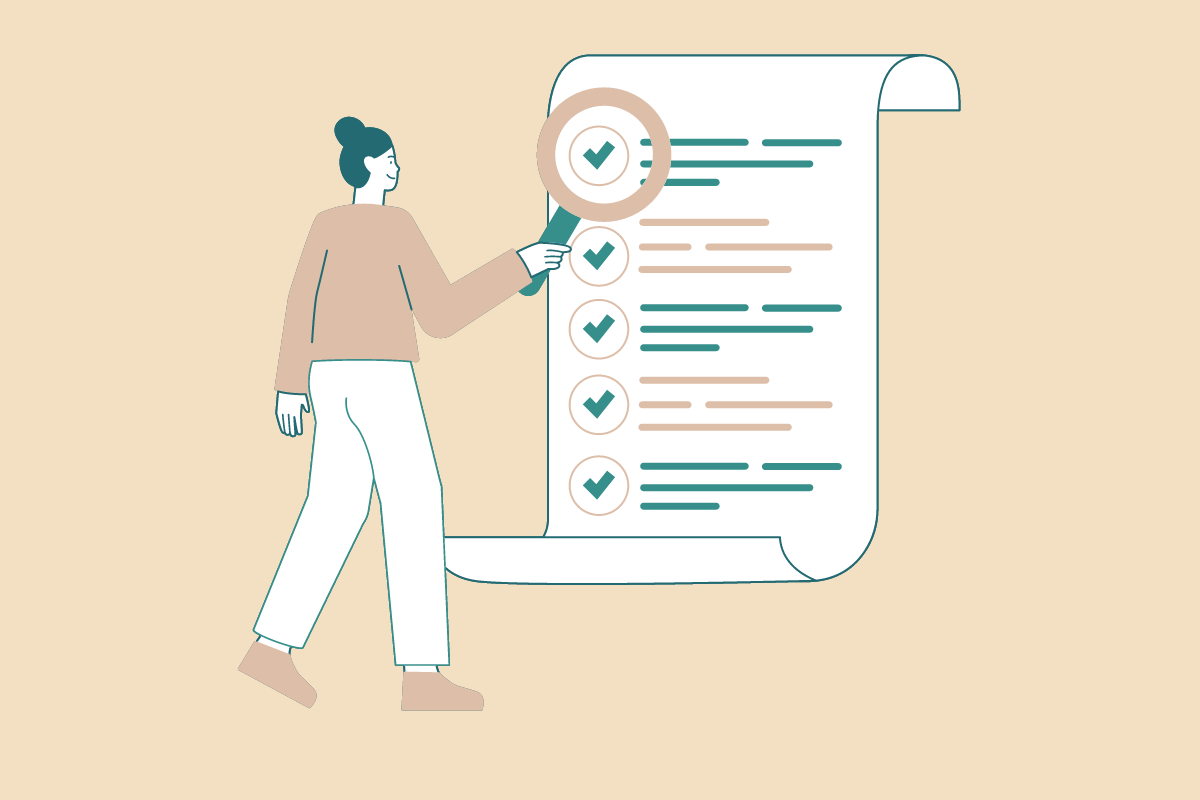Looking for good performance review questions? This article provides a comprehensive list that will help you evaluate employee performance, recognize strengths, and identify growth areas. Whether you are an HR manager preparing questions for an employee review or anyone in a leadership role looking for the best performance review questions, you’ll find questions that uncover valuable information for managers and employees alike.
Many of the questions below are geared to be answered by the employee, but can easily be turned around so the manager uses them to assess the employee. Either way, it is important to ask the employee some targeted questions to understand their point of view and alleviate misunderstandings and misinterpretations.
Key Takeaways
- Effective performance reviews hinge on structured, targeted questions that assess employee strengths and areas for improvement.
- Integrating peer feedback and self-evaluations enhances the review process by providing diverse perspectives on employee performance.
- Performance reviews bring value to a company by providing valuable insights into an employee’s current role and an employee’s future growth. These are key data points that help a company succeed .
Essential Performance Review Questions to Ask Employees

The right performance review questions are pivotal in assessing an employee’s performance, strengths, and areas for improvement. The best performance review questions help HR managers identify top performers, track progress, and set development goals. These insights then help drive company value by identifying areas for improvement across departments.
Structured questions ensure a smooth review process and provide clear, actionable feedback. Asking the right performance review questions targeted at specific aspects of an employee’s role can enhance both the review process and employee engagement.
Evaluating Overall Performance
Evaluating overall performance is fundamental to performance reviews. The best questions focus on assessing accomplishments, impact, and development over the review period. Combining both quantitative and qualitative metrics leads to a more comprehensive evaluation.
Questions might include:
- “On a scale of 1 to 10, how would you rate yourself in job performance over the last year (or past few months, depending on frequency of evaluations)?”
- “Rank your performance in each of the following roles (list some of the key responsibilities of the employee’s job role)”
- “What kind of tasks and responsibilities in your role come easiest to you? Which are the most challenging?”
When employees answer broader questions, it can be a great tool to use in evaluating an employee’s overall performance. Design these questions to facilitate clear feedback and actionable insights, helping employees understand their strengths and areas for improvement.
Identifying Employee Strengths
Recognizing employee strengths is crucial for aligning their potential with organizational goals. Effective performance review questions in this category should be strategic and tailored to uncover unique strengths. Key behaviors to measure include collaboration, professionalism, and overall job performance, focusing on competencies such as project management and problem-solving.
Questions such as
- “What do you consider your strongest skills?”
- “How have your employee’s strengths contributed to your team’s success?”
prompt employees to reflect on their personal strengths and gain acknowledgment for their excellent performance.
Areas for Improvement
Employee review questions targeting areas for improvement aim to identify gaps that hinder an employee’s full performance potential. Framing these questions comfortably can lead to more productive discussions about needs and development plans. Recognizing employee contributions and providing guidance for improvement are both important.
Questions such as
- “What challenges have you faced in your role?”
- “If you could have handled something differently, what would it be, and what would you have changed?”
- “What support do you need to improve your performance?”
are effective in this category. These questions aim to provide meaningful feedback and foster a culture of continuous improvement.
Key Performance Review Questions for Managers

Managers are key in the performance review process, setting performance goals and facilitating growth discussions. Performance review questions for managers should focus on assessing team contributions, leadership and management skills, and strategic goals.
Including multi-rater feedback and open-ended questions offers deeper insights and promotes dialogue.
Assessing Team Contributions
Assessing a manager’s contributions helps measure their role in enhancing team cohesion and achieving success. Assessing individual contributions through peer feedback can improve team dynamics and align with shared objectives. Focus questions on individual skills and contributions in collaborative efforts.
- “How do you contribute to team projects?”
- “What impact have you had on your team’s success?”
- “What role(s) do you typically take on during team projects? Do you feel you are valued in that role?”
These questions will allow you to assess an employee’s influence on overall team performance and goal achievement and see how they feel about that influence. You can also compare answers with other performance reviews to see where team members overlap, and look out ways to avoid conflict or empower employees in new roles.
Leadership and Management Skills
Leadership and management skills are essential for inspiring, guiding, and developing teams. Questions for managers should assess their ability to lead and support their team’s objectives. They should also evaluate how well managers facilitate a positive company culture and teamwork.
- “How have you developed your team members?”
- “What strategies have you implemented to improve team performance?”
- “How do you handle team conflict or pushback?”
- “What are some accomplishments of your team that you feel you made a significant impact on?”
- “If you could make any one change to your team today, what would it be and why?”
These questions evaluate a manager’s leadership skills and their impact on team success. They also provide insights on how well managers handle conflict, and how confident they feel in themselves and their team.
Strategic Goals and Objectives
Incorporating performance goals during the evaluation produces a more measurable assessment. Some questions to understand performance objectives are:
- “What were some of your goals for the last year, and what progress did you make on those goals?”
- “Have any of your goals changed over the last year?”
- “What are some of your personal goals? Do you find your professional goals to help in achieving them?”
These questions help personal goals align with a company’s mission and greater organizational objectives, fostering a unified approach to employee development. They’ll also help to track performance in future evaluations, and allow for better performance management.
Employee Review Questions for Peer Evaluations

Peer evaluations offer a unique perspective on an employee’s performance, often highlighting strengths and areas for improvement that managers and employees may not notice. Peer feedback is valuable as peers often interact with employees daily and can provide insights into collaboration and teamwork skills.
Peer Feedback on Collaboration
Questions about collaboration gauge an individual’s effectiveness in working with others to achieve common goals. Effective peer feedback on collaboration assesses how well team members communicate and work together towards shared objectives.
Questions like
- “How effectively does this employee collaborate with others?”
- “Can you provide examples of their positive interactions with team members?”
- “If you could change one thing about how this employee engages with the team, what would it be?”
help evaluate an employee’s teamwork skills and contribution to team success.
Evaluating Peer Strengths and Weaknesses
Questions about peers’ strengths and weaknesses enable a clearer understanding of individual contributions to team dynamics. Recognizing strengths and weaknesses allows teams to leverage individual capabilities for collective improvement.
- “What are this employee’s key strengths?”
- “In what areas could this employee improve?”
- “If you could give this employee an award, what would it be?”
- “If you were going to go to this employee for advice, what would you ask them about?”
- “If you could get rid of one work habit of this employee, what would it be?”
These questions offer a well-rounded evaluation, combining positive feedback and areas for improvement. By asking more abstract questions, you can also uncover less candid responses from each team member, and really understand the innerworkings of a department.
Self-Evaluation Performance Review Questions

Self-evaluation questions help employees reflect on their performance and consider career goals, typically covering professional achievements and opportunities for growth.
These questions unearth how an employee feels regarding their contributions and aspirations, and help managers see how an employee’s self-reflection aligns with company values.
Reflecting on Personal Achievements
Self-evaluation questions should encourage employees to articulate their accomplishments during the performance period.
- “What were your most significant achievements this year?”
- “Which projects are you most proud of?”
- “What is one thing you were proud of this year that people might not know about?”
Reflecting on personal achievements helps individuals recognize their meaningful contribution to the organization and boost morale, setting the stage for meaningful performance conversations and enhancing one’s own performance. They can also identify areas where employees are or feel undervalued.
Self-Identified Growth Opportunities
Professional growth self-evaluation prompts help employees identify areas they wish to improve or develop further. Questions targeting growth areas stimulate continuous learning and encourage employees to take charge of their development.
Questions such as
- “What skills do you want to develop?”
- “What areas do you feel you need to improve?”
- “What was something new you did this year that you really enjoyed?”
- “If there was one part of your job you could erase, what would it be?”
encourage discussions about necessary training and areas of development for employee progression.
Future-Focused Employee Evaluation Questions

Future-focused performance review questions prepare employees for upcoming challenges and career growth. These questions can help guide future training opportunities, and set benchmarks for the next performance review.
Setting Career Goals
Questions focused on goal-setting help employees visualize their career paths and set clear, achievable actions to get there. Asking questions like
- “What is the most important goal you’d like to achieve during the next quarter?”
- “What goals do you have for the coming year ahead?”
- “What are your long-term career goals?”
- “What steps will you take to achieve these goals?”
They can aid managers in understanding what might be the next position in the employee’s career path. Responses also help employers see areas for improvement within the organization that can help employees do their job effectively, and identify actionable steps moving forward.
Setting SMART goals (Specific, Measurable, Achievable, Relevant, and Time-Bound) after reviews can improve clarity and focus for future performance expectations.
Professional Development Plans
Employees should discuss skills they feel need enhancement for their career growth. Planning for the future helps employees align their aspirations with achievable outcomes for skill enhancement.
Ask questions such as:
- “What professional development opportunities are you interested in?”
- “How can the company support your professional growth?”
- “Are there any learning opportunities you feel are missing from training or development curriculum?”
to identify paths for growth and development.
Preparing for Future Challenges

Employee reviews should always include questions about potential challenges. This helps prepare employees for upcoming changes in their roles. Discussing potential challenges helps employees adapt and thrive in changing environments. Questions to ask include:
- “What challenges do you foresee in your role?”
- “How can you prepare for these challenges?”
- “What potential roadblocks do you see in achieving your goals?”
- “How can your team better support you?”
- “If you could wave a magic wand and change one thing about your workplace, what would it be?”
These questions help employees foresee obstacles and strategize effective responses, while identifying roadblocks to managers and ensuring the organization is not playing a part in creating those roadblocks. Be sure to ask about challenges in the next quarter, 6 months, and year to get a full picture of any potential obstacles.
Crafting Effective Performance Review Questions

Creating effective performance review questions requires aligning them with specific roles and business objectives. Questions should focus on employee development rather than just evaluation, and allow for employees to share their true feelings about their position in the organization.
And don’t forget, the questions should clearly identify a certain period of time, so employees can provide the most relevant and timely answers.
Understanding the Purpose
Performance reviews primarily aim to evaluate employees and find areas for improvement and development. When creating performance review questions, consider the objective, structure, overall theme, and timeline of the review cycle.
Questions you can ask yourself before developing questions for your performance appraisals are:
- “What are the primary goals of this review?”
- “What is it absolutely essential that I know at the end of this review?”
- “What are some things employees might not want to share, and what ways might help them feel more comfortable to share?”
These questions help define the purpose of performance review questions and set the stage for open communication and valuable feedback.
Creating a Balance of Questions
Some performance review questions should lead to elaboration, avoiding simple yes or no answers to encourage enough valuable feedback. Others should require straightforward answers. A series of balanced questions allow for both quantitative and qualitative evaluations, enhancing the overall performance review process.
Here are some examples:
- “Can you describe a challenging project you worked on?”
- “What metrics do you use to measure your success?”
By combining diverse question types and clear communication, you’ll experience comprehensive evaluations benefiting both employees and organizations.
Customizing Questions for Roles
Tailoring performance review questions to specific job roles ensures you receive feedback that’s relevant and actionable. Custom review templates can easily be found online, and enable businesses to tailor the evaluation process to meet specific organizational needs, enhancing relevance and effectiveness.
Questions like
- “How does your current role contribute to the company’s goals?”
- “What unique challenges do you face in your current role?”
address specific job functions and expectations, providing more targeted and meaningful feedback.
Best Practices for Conducting Performance Reviews

Effective performance reviews are crucial for enhancing employee retention, engagement, and productivity. Using standardized templates and focusing on future growth can enhance employee performance during employee performance review and employee reviews.
Adopting the following best practices ensures a smooth and productive review process.
Achieve Buy-in from Supervisors
All the time and effort that went into creating performance review processes can be thwarted if supervisors do not see the value of conducting them and don’t buy in to new processes. Getting supervisors to embrace creating and conducting performance reviews involves highlighting the value these evaluations bring to both the team and the organization.
Start by emphasizing how performance reviews can enhance team performance by identifying strengths, addressing areas for improvement, and setting clear goals. This process not only helps employees grow but also contributes to the overall success of the department, making supervisors’ jobs easier in the long run.
Link performance reviews to organizational objectives. Show how aligning individual performance with broader company goals improves efficiency and outcomes. It may take additional time to prove these points, but it will be time well spent. Providing training and resources, conducting mock reviews for handling sensitive situations, or creating games or contests can also help alleviate concerns that supervisors might have. They will feel more equipped to conduct effective reviews and understand their importance.
Achieve Buy-In from Shop Floor Employees
Shop floor employees can be especially challenging when it comes to performance reviews. They often feel negativity towards the process, which affects not only their own performance after the review, but the general attitude of their co-workers when the topic is discussed.
A previous review may have focused on poor performance and thus clouds their perception of performance reviews in general. In other cases, any suggestion at all can be perceived as criticism. This can be a tricky situation.
Here are some suggestions to encourage shop employees to approach performance reviews in a more positively manner include:
- Frame the process as an opportunity for personal and professional growth.
- Emphasize that performance reviews are not just about evaluating past performance, but about identifying areas where they can develop new skills, achieve personal goals, and potentially advance within the company.
- Make it clear that the feedback provided is intended to support their success, not just to highlight shortcomings.
- Involve them in setting their own goals during the review process, giving them a sense of ownership over their development.
- Consider having someone other than the employee’s supervisor conduct the review, or at minimum, have another lead person present during the review. This can be especially helpful in situations where the employee and their supervisor do not have the best relationship. Both the employee and supervisor may be more courteous, respectful, and honest with each other when sensitive situations are addressed.
Above all, ensure that the process is transparent and fair, and that it includes recognition of the employee’s hard work and accomplishments. This can help build trust and a more positive attitude towards both the supervisor and performance reviews.
Structuring the Performance Review Process
Setting clear goals streamlines the performance appraisal process. Managers should be trained to effectively conduct performance reviews, and employees should be informed about the setup and their roles in the process.
Creating a structured review process involves preparing performance appraisal forms or employee evaluation questionnaires and setting timelines for follow-up discussions. This ensures that the review cycle is organized and effective.
Providing Constructive Feedback
Driving constructive feedback is the primary focus of development-based performance reviews. Implementing real-time feedback mechanisms enables immediate communication of performance insights, allowing for prompt corrections and improvements.
Questions should be framed to make employees comfortable discussing their needs and should involve specific examples of performance, emphasizing measurable outcomes. This approach cultivates a feedback loop that ensures ongoing employee growth and strengthens the manager-employee relationship.
Following Up on Reviews
Setting timelines for follow-up is essential after performance reviews to ensure ongoing development. Regular check-ins and documenting notes from performance review meetings aid in tracking progress and planning follow-up discussions.
Keeping records of performance reviews helps track employee progress and assess eligibility for promotions. Referring back to the last performance review forms provides insights for future performance assessments.
Summary
Performance reviews are a vital tool for fostering employee development and organizational success. By using the right performance review questions, managers can provide valuable feedback, identify strengths, and address areas for improvement. Tailored questions and real-time feedback mechanisms enhance the performance review process, making it more effective and engaging for employees.
Remember, performance reviews are not just about evaluating past performance; they are about setting the stage for future growth. By aligning personal goals with organizational objectives, employees and managers can work together to achieve success.


